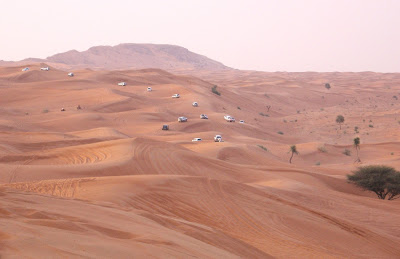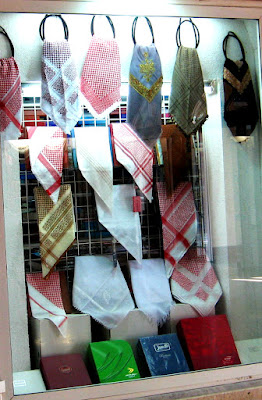DRIVER’S LICENSE
So, here’s the most bizarre thing. I had to have a Permission Letter
(stamped, signed, sealed) from my husband stating that he would allow
me to get my Driver's License! Can you believe that? What year is this? Oh, please, please... Let me drive in
this crazy city with these crazy drivers. I also needed his permission to
get a job (another story)! And just remember that in Saudi Arabia, if you
are a woman, you CANNOT ever drive a car! Forget about it. Period, full stop, no kidding.
You must be 18 years old to obtain your driver's license in the UAE and most people go to Driving School to learn to drive. Westerners have no problem getting a license. Just show your current license from your country, give them a passport photo, and pay for the new license. Unless, of course, you’re a woman. But, if you are not from the USA, the UK or Canada, etc., then it's much harder to get your license. Non-western women fail the driving test a dozen times or more before passing. Cultural issue? One less freedom for women? I think so.
Of course, if you are a woman, you must hire a female driving instructor. You must also have your husband's approval or father's permission to take driving lessons and/or get your driver's license. So, it's a really big deal for Emirati ladies and other Middle Eastern women when they finally pass the test and get their driver's licenses. However, many Emirati women have drivers, in which case they won’t be given permission to drive.
Other expats, men and women from Jordan,
Lebanon, Iran, Syria, are quite excited and proud to learn to drive because
most of them have not had this privilege or opportunity in their home
country. So, you have a lot of drivers
new to the concept of driving. Makes me wonder
how safe the roads are because of these inexperienced drivers. Also, how
well can you see to drive when you are wearing a full veil or a burqa?
Think about that...
DRIVING IN THE DESERT AND THE CITY
Everyone beeps his or her horn while
driving. This cacophony of sound drives me
nuts! I thought driving in Los Angeles
was a nightmare. Well, that was a picnic compared to Dubai. Over
a million people in Dubai, many who learned to drive in countries that have few
roads and even fewer ‘rules of the road’.
RULES OF THE ROAD
They are mainly for expats and visitors in
the country. The Emiratis or Nationals don't follow many rules of the
road. They love to drive fast in their
giant SUVs, Mercedes, Lexus cars, swerving in and out of traffic, honking their
horns and flashing their lights. If they
are involved in an accident, it is never their fault and they are not
ticketed. In addition, remember that all
Police Officers are also Emiratis.
TRAFFIC ACCIDENTS
They are usually young 'fatalities'
because people drive far too fast for the roads, the fog and occasional rain or
drizzle. In addition, there are just
so many cars on the roads and not everyone wears seatbelts, especially
Emiratis.
Doesn’t seem to be a law! Hop in your
Mercedes, Range Rover, Land Cruiser or Rolls Royce and drive away. Another
reason accidents are called 'fatalities'.
Not sure this is a law either! No
kidding... You don’t see them in cars often. Children just climb, play and hop around
in the cars with no seat belts or car seats. Remember when we were
growing up and children sat on their parents' laps and helped them drive?
Well, they still do that in the Middle East. Very scary...
This is part of the driving experience here. If you want someone to drive faster or move out of your way, just roar up behind them and flash your lights at them. Everyone knows to move over and let the guy pass. He’s speeding and wants to continue speeding.
HAND GESTURES
Don’t do it! No hand gestures should ever be made
while driving – EVER, unless you want to go to jail. No kidding. If
you make a gesture at a National (an Emirati), they will write
your license plate number down and call the police. Later that day,
you will have a visitor at your apartment door. You will
be taken to jail to explain what you did because a complaint will
have been filed against you. You’ll probably pay a fine, you may have to
give an apology, but rest assured, you won't have a good evening and you won't
be on their Christmas card list! Recently, an Australian chap used a hand
gesture and was put in jail for 24 days, then deported.
CAMERA TICKETING
The cameras are EVERYWHERE! They are
big, small, tall, short, hidden in palm trees, openly displayed at
intersections, on the streets, at crosswalks and attached to stoplights. Police
rarely stop motorists for traffic violations.
But, if you are speeding, run a red light or make an illegal U-turn, the
camera simply snaps a clear picture of your license plate. Then, when you
try to renew your license plates, your driver's license or want to
leave the country - SURPRISE!!!
Now, you have to pay hundreds or thousands
of dirhams in tickets for the past year. YIKES!!! You must
pay all of your fines or you simply won't be able to leave the
country. Actually, all debts and outstanding bills (utility, rent, etc.)
must be paid in full or you won't be getting on that airplane to fly
home.
CAMELS ON THE ROADS
Driving means sharing the road with camels, expecially out of the city! They roam free and often get out of the large fenced in areas. So be on the lookout as they blend in with the desert. Every single camel has an owner, therefore you don’t want to hit or kill a camel. They are worth thousands of dirhams and you will pay for the camel if you injure or kill it.
Buckle up and drive safely! And remember, call when you get there. It's against the law to talk on your cell phone while driving in Dubai!
|
|

















.JPG)

.JPG)






.JPG)

